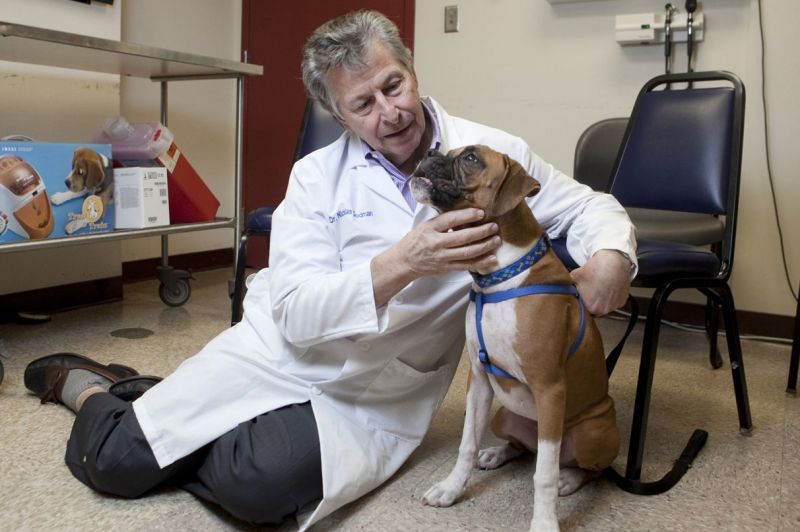Comprehending the Function of a Veterinary Behaviourist in Animal Training and Health
The duty of a veterinary behaviourist is essential in resolving the detailed connection between family pets and their owners. They combine vet medicine with insights from animal habits science to take on issues like hostility and anxiety. Unlike typical fitness instructors, their approach focuses on the underlying causes of these habits. This nuanced perspective increases concerns about the performance of conventional training techniques and just how a deeper understanding can change pet well-being. What methods do they utilize to attain these outcomes?
What Is a Vet Behaviourist?
A vet behaviourist is a customized specialist who concentrates on understanding and resolving the behavior issues of animals, specifically pets. Their competence incorporates veterinary medicine and animal habits science, enabling them to detect and deal with a large range of behavior problems - board certified veterinary behaviourist. These specialists typically hold postgraduate degrees, such as a Master's or PhD in pet habits, and are certified by relevant organizations, ensuring they possess a deep understanding of pet psychology
Veterinary behaviourists examine pets via detailed observation and evaluation, taking into consideration factors such as genetics, setting, and training background. They establish customized actions adjustment plans, which may include desensitization techniques, favorable support approaches, and ecological modifications. Collaboration with animal owners is vital, as they supply guidance and assistance throughout the training procedure. Eventually, the objective of a veterinary behaviourist is to enhance the well-being of the pet while fostering a harmonious relationship between pet dogs and their proprietors.
The Importance of Understanding Pet Habits
Comprehending animal habits is vital for both family pet owners and specialists in the area of animal treatment, as it lays the structure for effective communication and training. Recognizing just how pets perceive their setting and react to stimuli enables caretakers to produce a much more harmonious living scenario. Insight into behavior cues, such as body movement and vocalizations, fosters more powerful bonds between pets and their owners. By appreciating the natural impulses and requirements of different types, individuals can tailor their training approaches to fit these factors, promoting far better understanding and participation. In addition, a strong grasp of behavior scientific research aids in identifying stress factors and prospective triggers, permitting proactive interventions. Overall, understanding pet behavior not only enhances the wellness of pets however additionally enhances the experiences of those that look after them, ultimately leading to much healthier, better relationships.
Typical Behavioral Issues Resolved by Veterinary Behaviourists
Vet behaviourists regularly address common behavioral issues in family pets, consisting of hostility and anxiety reactions. They likewise focus on anxiousness and stress administration, which can considerably influence an animal's wellness. Recognizing these concerns is essential for creating reliable training and intervention techniques.
Hostility and Concern Feedbacks
While many animal owners may view hostility and worry reactions as easy behavioral concerns, these intricate responses typically come from underlying anxiousness or previous trauma. Veterinary behaviourists play a vital role in identifying the source of these habits, which can manifest in numerous types, including growling, biting, or too much fear of particular circumstances. Comprehending these triggers is important for creating reliable training techniques tailored per animal's distinct circumstances. Behaviourists use techniques such as desensitization and counter-conditioning to help animals manage their anxieties and hostility. Additionally, they enlighten pet proprietors regarding appropriate administration strategies, stressing the relevance of patience and uniformity. Resolving aggressiveness and concern reactions not just improves the pet dog's lifestyle yet additionally enhances the bond in between animal and proprietor.
Anxiety and Stress Monitoring
Anxiety and stress prevail issues that numerous animals encounter, typically arising from modifications in their environment, lack of socialization, or previous adverse experiences. Vet behaviourists play an essential function in recognizing the underlying sources of these issues. They employ different strategies, consisting of behavioral modification, desensitization, and counter-conditioning, to aid pet dogs manage stress and anxiety. In enhancement, they might advise environmental changes, such as producing risk-free spaces or offering enrichment tasks that advertise leisure. Collaboration with pet proprietors is crucial, as behaviourists assist them in recognizing their family pet's signals and applying reliable coping approaches. By dealing with stress and anxiety and stress and anxiety, vet behaviourists add considerably to enhancing the general wellness and high quality of anchor life for family pets and their families.
How Vet Behaviourists Differ From Conventional Fitness Instructors
Vet behaviourists vary from typical instructors mostly in their instructional histories and training. While typical fitness instructors commonly focus on obedience and basic commands, vet behaviourists stress understanding and resolving underlying behavioral problems, incorporating medical factors to consider into their strategy. This distinct emphasis permits them to give a much more complete therapy for family pets with complex behavior challenges.
Education and Training Distinctions
Understanding the difference in between vet behaviourists and conventional trainers is necessary for animal proprietors looking for reliable training solutions. Vet behaviourists possess sophisticated levels in veterinary medication, often adhered to by specialized training in animal practices. This education and learning equips them to resolve complex behavioral issues that might stem from clinical problems or psychological aspects. In comparison, conventional instructors usually have qualifications from training programs that concentrate on obedience and basic commands without delving into the underlying psychological or medical elements. While both specialists intend to improve pet behavior, vet behaviourists can diagnose and treat behavioral issues holistically, incorporating clinical expertise into training strategies. This vital distinction highlights the relevance of picking the right specialist based on the pet's particular requirements.
Emphasis on Behavioral Issues
Attending to behavioral problems needs a nuanced technique that identifies veterinary behaviourists from typical instructors. While traditional trainers frequently concentrate on obedience and standard commands, vet behaviourists check out much deeper into the underlying sources of bothersome practices. They use a comprehensive understanding of pet psychology and therapy techniques, which are rooted in scientific research study. This expertise allows them to determine problems stemming from anxiety, worry, or aggressiveness, instead of merely resolving surface-level signs and symptoms. Furthermore, veterinary behaviourists assess the pet's overall health, thinking about environmental aspects and the pet's history. By incorporating medical knowledge with behavioural techniques, they provide tailored remedies that advertise long-lasting behavioural adjustment, making sure both the pet's and owner's quality of life are considerably boosted.
Medical Factors To Consider Included
While typical instructors may forget underlying clinical problems, vet behaviourists prioritize a detailed evaluation of an animal's health and wellness as a fundamental step in resolving behavioural troubles. This approach enables them to recognize potential clinical problems that might add to unfavorable practices, such as stress and anxiety, discomfort, or neurological disorders. By integrating medical assessments right into their practice, veterinary behaviourists can work together with vets to guarantee an all natural understanding of the animal's wellness. Furthermore, they can advise proper treatments or adjustments to training strategies based upon clinical findings. This comprehensive point of view identifies vet behaviourists from conventional fitness instructors, as they attend to both behavioral and health-related variables, inevitably resulting in much more efficient and sustainable results for animals and their owners.

The Process of Collaborating With a Veterinary Behaviourist
Working together with a vet behaviourist entails a methodical approach to resolving a pet dog's behavior issues. Originally, the process starts with a considerable assessment, where the behaviourist collects comprehensive details about the family pet's history, atmosphere, and details behaviors that are troublesome. This commonly includes sets of questions, meetings with the animal proprietor, and occasionally observations of the family pet in its atmosphere.
Adhering to the assessment, the veterinary behaviourist formulates a tailored intervention plan that may include behavioral adjustment techniques, training techniques, and, if essential, referrals for clinical evaluations. veterinary behaviour. The plan is made to be sensible and possible, guaranteeing that it fits effortlessly right into the pet dog proprietor's way of living
Succeeding follow-up sessions are necessary to keep an eye on development, adjust techniques, and provide assistance. This collective initiative not just aims to change unwanted actions however also to boost the general health of the family pet, ensuring an unified relationship in between the animal and its proprietor.
Enhancing Your Pet's Lifestyle With Behavioral Assistance
Enhancing a family pet's quality of life with behavior support is crucial for fostering a healthy and meeting relationship in between pets and their owners (board certified veterinary behaviourist). Vet behaviourists play a vital function in recognizing and addressing behavioral problems that might hinder a pet dog's well-being. With tailored methods, they help minimize anxiousness, fear, and aggression, eventually advertising an extra well balanced and happy pet
Behavioral assistance includes numerous strategies, consisting of favorable reinforcement, environmental enrichment, and socialization. By executing these methods, owners can create Full Article a nurturing environment that encourages positive actions. This not just enhances the pet dog's emotional health and wellness but also reinforces the bond between animal and owner.
Furthermore, regular examinations with a veterinary behaviourist guarantee that any emerging behavior problems are quickly attended to, protecting against rise. Generally, buying behavior assistance is a positive technique that significantly enriches a pet dog's life, bring about improved physical and psychological wellness results.
Regularly Asked Concerns
What Qualifications Do Vet Behaviourists Possess?
Veterinary behaviourists typically hold a veterinary level, complied with by specialized training in pet habits. Lots of additionally i loved this possess qualifications from acknowledged organizations, showing their expertise in addressing animal behavior issues and advertising general animal wellness.
Can Veterinary Behaviourists Recommend Medicine for Pets?


Vet behaviourists, having veterinary degrees and specialized training, can certainly recommend drug for animals. This capability allows them to address underlying behavioral issues effectively, frequently combining medicinal treatment with behavioral modification strategies for best outcomes.
How Much Time Does Behavioral Treatment Commonly Take?
Behavior modification period differs substantially, normally ranging from a few weeks to several months. Factors affecting this timeline consist of the animal's specific issues, uniformity of training, and the owner's involvement at the same time.
Are Remote Assessments Available With Vet Behaviourists?

Just how much Does a Vet Behaviourist Examination Price?
The price of a vet behaviourist consultation usually ranges from $100 to $300, depending upon aspects such as place, experience, and session length. Added costs might make an application for follow-up assessments or specialized services.